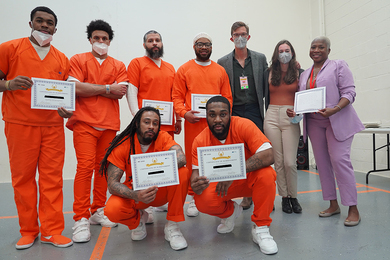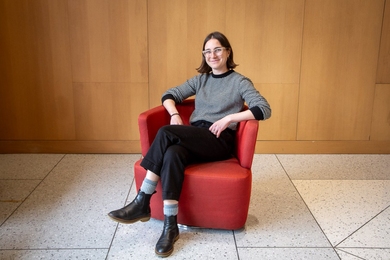The TV crime drama "CSI," the U.S. Air Force, and the Florida Department of Children and Families have at least one thing in common--they've all enlisted the services of alumnus Ed Markowitz (S.M. 1971).
The process-analysis skills Markowitz developed as an engineering and management student at MIT are the basis of a career in optimizing complex systems--whether those systems are military logistics chains or TV productions.
Markowitz returned to campus earlier this month as one of several alumni volunteer teaching assistants at a week-long, corporate-style training seminar for sophomores in the Undergraduate Practice Opportunities Program. UPOP is a mentoring and internship program that helps students develop engineering, business and interpersonal skills to put them a step ahead in their careers.
Now CEO of e-strategylabs, inc., Markowitz epitomizes a UPOP lesson--that careers can take unexpected twists and turns, so trying to map out your life when you're 20 is probably unrealistic and limiting. "An MIT grad can do anything. I don't have formal credentials in 90 percent of what I do. MIT's education in thought processes--thinking like an engineer--is what allowed me to do all this stuff," said Markowitz.
Perhaps the most intriguing of his clients are those in the entertainment industry. Working with the producers of several television shows, including "The Practice" and "CSI" and its spinoffs, "CSI: Miami" and "CSI: New York," he optimized production processes, from script to locations to intellectual property issues.
He is called upon at times to review scripts for technical accuracy. "Can a PDA [personal digital assistant] that's been shot with a .38 caliber bullet have information recovered from it?" was one question Markowitz had to resolve for an episode of "Threat Matrix," a homeland security drama. The crime-solving plots of "CSI" hinge on a trail of obscure clues uncovered by a team of forensic experts. Markowitz helps make sure that the technical details underlying these plots are feasible.
He has also helped reality shows, such as "The Real World," solve production problems. Unlike dramas or sitcoms, reality shows involve several cameras in multiple locations shooting nearly 24 hours a day. Thousands of hours of video must then be pared down to one hour of programming per week. Markowitz tackled the problem of "how you deal with all this data" to create a show that meets tight airing deadlines and makes a profit, he said.
Markowitz said he gets a kick out of working in Hollywood but the most rewarding thing he has done recently is working to improve child protective services in his home state of Florida. Tapped by concerned legislators after some well-publicized failures of the Department of Children and Families, Markowitz devised a plan that would improve the process of identifying children at risk and save the state millions of dollars. Stymied by politics, however, the plan has yet to be implemented, Markowitz said.
That experience is another example of a key UPOP lesson: problem-solving in the real world can be messy. "You might have the greatest solution in the world, but it's meaningless if it's not put to use," he said.
A version of this article appeared in MIT Tech Talk on January 26, 2005 (download PDF).






